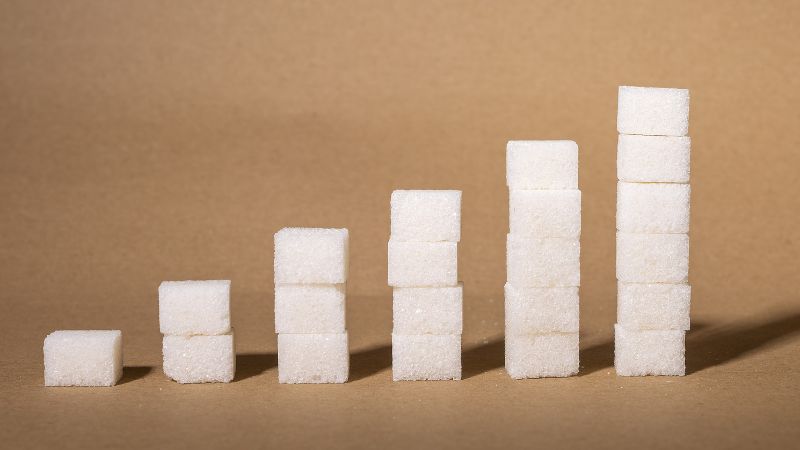READ TIME: 9m
DR JOHN DEMARTINI - Updated 1 year ago
From childhood, you have probably been rewarded with sugar at least once, which could have contributed to you developing what some call a "sweet tooth." But what impact does sugar actually have on your mind and well-being?
Without a doubt, your brain requires sugar as its primary nutrient. However, both excessive and insufficient amounts can cause cognitive dysfunction, or more broadly, cognitive impairment.
Not all sugars are created equal
There are different types of sugars: COMPLEX carbohydrates that break down slowly into sugar, and SIMPLE sugars that rapidly enter the bloodstream, most often causing spikes and subsequent drops in your blood sugar levels. There are also NATURAL metabolically derived sugars derived from fats and proteins that the body metabolizes and converts back into sugar.
While the brain needs sugar, it's wise to recognize that, like anything, moderation is key. In the same way that consuming too much or too little water can cause problems, so too can consuming too much or too little sugar lead to problems.
Eating more sugar than is ideal likely impairs your cognitive function by causing spikes that can make you feel manic. When in a manic state, you’ll tend to perceive things positively and more optimistically, often becoming blind to any downsides. Then, when these sugar levels drop, you’ll likely become more pessimistic and irritable instead of neutral and objective. So sugar spikes are more likely to affect your cognitive function and focus.
While many people have heard of insulin resistance, fewer people appear to have heard about leptin resistance. By eating more sugar than ideal, you can disrupt the hormone leptin’s feedback mechanism that signals when you are full, often resulting in overeating.
Excessive amounts of sugar can also contribute to obesity, type 2 diabetes, and cardiovascular conditions. Plus, if you gain weight, it can impact your hips, joints, knees, and overall energy levels, which makes you more vulnerable to emotional volatility.

So the question is, are you overeating sugar?
If you're someone who orders drinks from Starbucks or other similar stores, you might want to do a little research on how many teaspoons of sugar it contains. I know for myself, having been taught this by Paul Bragg when I was 17, not to consume white sugar, white flour, or white salt. As a result, I haven't added salt to my diet or eaten sugar or white flour for 51+ years.
I try my best to fill my body with real food, not empty calories. This does include eating fruits and their natural fruit sugars, as well as vegetables like carrots and beets that have a natural sweetness. I also eat bread, which breaks down into sugar as a complex carbohydrate. This provides my brain with adequate sugar. However, I have definitely noticed that consuming even slightly more sugar than normal can be problematic for me, which is why I limit myself to just a sip of fruit juices. Simply put, they contain too much sugar, which tends to cause sugar spikes and subsequent crashes that can leave you feeling volatile and emotional, and your brain with diminished clarity and stability.
In fact, if you experience too many sugar spikes followed by crashes, your brain more frequently focuses on amygdala-driven responses. These are the fight-or-flight reactive responses like you see in the wild. So, instead of engaging in your executive function where you have self-governance and strategic planning, you instead tend to become irritable and overreact emotionally.
Even when it comes to yogurt, which is generally perceived as being a healthy food choice, I choose plain Greek yogurt and chose not to eat anything with added sweets. In essence, I am very much what I call a “calm carbohydrate individual”.
Eating too much sugar also affects your teeth, immune system, cardiovascular system, and emotional stability. It also decreases your likelihood of maintaining cognitive centeredness and mastery.
At the same time, if you are fasting and don’t have any sugar released in your brain, that can also lead to problems. So, consuming too little sources of complex or simple sugar is also not wise; it's about finding the right balance.
In my case, I don't add sugar, honey, or other sweeteners to my diet - I choose not to consume excessive sweets, except for the natural sugars in fresh fruit or complex carbohydrates in grains. That’s the sweetest thing I eat. And because of this, I don't experience volatility. I maintain stable energy, and my brain function stays alert and sharp as a result.

It is wise to stop and take inventory of your sugar intake and consider the impact it may have on your well-being.
Eating too much sugar can cause glycation in the skin (loss of elasticity and firmness), gumming up in the brain, and problems with the pancreas. As I mentioned earlier, eating more sugar than is ideal also tends to disrupt your brain's feedback mechanisms involving hormones like leptin and ghrelin, which can throw off your eating patterns. Also, consuming too much sugar creates a need for more insulin because your blood sugar is so high, similar to what happens if you stimulate it with glucagon. Over time, you can burn out your pancreas by forcing it to overproduce insulin.
There are very definite signs that sugar affects the brain. Your brain needs a stable, steady level of sugar. If you cause your sugar levels to spike and then plummet, you might find yourself overeating sugars and sweets - becoming manic, making impulsive decisions, setting overly ambitious goals in unrealistic timeframes, and then experiencing a crash, feeling unable to accomplish your goals.
These fluctuations severely impair your executive functions and stop you from mastering your life.
Conversely, I've found that people who do not live by priority, are not maximizing their blood, glucose and oxygen into the forebrain, they reduce their executive function, have challenge moderating their behaviors, revert to their amygdala responses, and tend to become more impulsive and instinctual. This most often leads to avoiding and seeking distractions, and emotional responses or reactions, which in my opinion, is not the wisest or fulfilling way to live.
So, I advise moderation. Just look online to see how much sugar the average individual consumes in a year, the amount in tablespoons or pounds may surprise you. It's excessive, and it's no wonder many people have health problems, cardiovascular issues and obesity.
You're either living to eat or eating to live, and I choose to eat to live.
I frequently ask myself what the highest priority food items I can eat that will help me maintain optimal cognitive function. I have an important role in educating, researching, and learning so I prefer my brain functioning at its greatest. That's why I do not add sugars to my diet and stick to only simple fruits, vegetables and grains and in moderation. This gives me steady, stable energy.
I often advise people to moderate their sugar intake, not necessarily eliminate it. Eat wisely. Think about what you are feeding your body and how much sugar you are consuming, because it will have consequences. For example, by constantly consuming sugars, you can wear down your pancreatic function making you more susceptible to type two diabetes. So, again, consider the wisdom in being moderate and proactive about your diet.

Consider what you prioritize daily.
If you're not living congruently with your highest values and priorities, and ensuring that you eat to live and perform - not just for immediate gratification, which sugar often provides – you are more likely to give in to impulsive behaviors. It is wiser to prioritize your diet, the actions you’re taking, and who you’re associating with, because if you aren't living for inspiration, you’re more likely to fall for desperation.
One of the reasons I teach my signature 2-day Breakthrough Experience program almost every week is to show people how to prioritize their lives and actions.
Imagine this: if you have something important coming up, like a wedding or a beach holiday where you want to look your greatest, you tend to be more disciplined because you have a meaningful priority to focus on. As a result, you don’t tend to go into volatilities and overeat sugars because you’re more disciplined and intrinsically inspired. But if your day is not filled with inspiring activities, you become more vulnerable to giving in to quick fixes and sugar highs, which is why many people lose control of their diet on weekends, only to regain discipline by Sunday night because they know they have responsibilities the following day.
That's why I firmly believe in staying active and more fulfilled with high-priority actions so you’re not as vulnerable to your amygdala’s immediate gratifying responses, because that's when the urge to overeat sugar kicks in, initiating a vicious cycle that affects your executive function. That’s why prioritizing what you do and what you eat is key in the journey to mastering your mind and mastering your life.
In the Breakthrough Experience, I teach people how to become clear of their priorities by identifying and understanding their highest values. Once they know what’s important to them I then show them how to align their actions accordingly.
Asking yourself what’s priority in terms of eating, and who you hang out with, is also wise. If you spend time with people who are inspired by what they’re doing and going paced in life, you’ll tend to follow in that direction. Conversely, if you hang out with people who perceive that they are victims of their history, you’ll tend to go in that direction.
So, prioritize what you do in life and who you do it with, and watch the difference.
To Sum Up:
Your dietary choices, particularly when it comes to your sugar intake, significantly impact your overall health and well-being. It can also have a significant impact on your cognitive function, emotional stability, and physical health.
Taking the time to learn about the different types of sugars and their likely effect on your body, while being mindful to practice moderation, is a wise first step in implementing a more balanced diet and lifestyle. It's not about completely eliminating natural sugars but rather finding the right balance that supports your health and wellbeing in every way.
Prioritizing what you choose to put into your body is just as important as prioritizing who to surround yourself with.
Learning how to live congruently with your highest values and priorities, will also help you make wiser choices when it comes to how much sugar (and what types of sugar) you eat.
Are you ready for the NEXT STEP?
If you’re seriously committed to your own growth, if you’re ready to make a change now and you’d love some help doing so, then click on the LIVE chat button bottom right of your screen and chat to us now.
Alternatively, you can book a FREE Discovery call with a member of the Demartini Team.
Interested in the Breakthrough Experience seminar?
If you’re ready to go inwards and do the work that will clear your blockages, clarify your vision and balance your mind, then you’ve found the perfect place to start with Dr Demartini at the Breakthrough Experience.
In 2 days you’ll learn how to solve any issue you are facing and reset the course of your life for greater achievement and fulfillment.
Click HERE to find out more
Important Notice:
The content shared in this blog is for education and personal development. It is not intended to diagnose, treat, cure, or prevent any psychological or medical conditions. The information and processes shared are for general educational purposes only and should not be considered a substitute for professional mental-health or medical advice. If you are experiencing acute distress or ongoing clinical concerns, please consult a licensed health-care provider.
Read full disclaimer HERE









